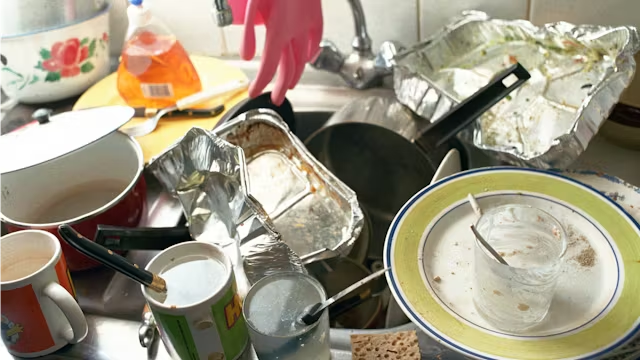After a long, busy day, the last thing anyone wants to do is stand over the sink scrubbing plates and forks. So we tell ourselves, “It’s fine—I’ll do it in the morning.” One night becomes two, then a week… and before you know it, that once-clean kitchen feels like a battleground.
But leaving dirty dishes in the sink isn’t just a lazy habit—it can bring consequences you might not predict.
 1. Bacteria Love a Dirty Sink
1. Bacteria Love a Dirty Sink
Food particles, grease, and moisture make your sink a perfect breeding ground for harmful bacteria like E.coli, Salmonella, and Listeria. These pathogens can accumulate overnight and expand to countertops, utensils, and even your hands.
And no, you don’t have to see mold or smell something awful for it to be dangerous. Germs don’t always declare their presence—they just quietly develop, putting your health at risk.
 2. Attracting Unwanted Guests
2. Attracting Unwanted Guests
That leftover pizza sauce or half-eaten sandwich scrap? It’s basically a neon sign for ants, cockroaches, fruit flies, and even mice. Once they seek a food source, pests don’t leave easily. A sink full of dirty dishes can become their new favorite hangout, turning a simple chore into a full-blown infestation.
And if you think soaking a plate quickly will prevent this—think again. Even the smallest residue can pay attention to bugs, especially overnight when your kitchen is quiet and dark.
 3. It’s a Mental Load You Don’t Need
3. It’s a Mental Load You Don’t Need
Ever spot how waking up to a messy kitchen instantly feels stressful?
A sink full of dishes is a visual reminder of something left undone. It can subtly weigh on your mind—even if you try to neglect it. Psychologists call this “cognitive clutter,” and it’s connected to increased anxiety, poor focus, and even procrastination in other parts of your life.
In short: unfinished chores like dishes aren’t just annoying—they can chip away at your mental well-being.
 4. The Hidden Relationship Tension
4. The Hidden Relationship Tension

If you live with a partner, roommate, or family, leaving dishes in the sink can silently create resentment. It might seem like a small thing, but shared responsibilities around the house are often at the root of major conflicts.
No one wants to feel like they’re the only one doing the dirty work. And over time, this “minor” issue can lead to serious frustration or even arguments.
 5. It Reinforces a Cycle of Avoidance
5. It Reinforces a Cycle of Avoidance
The more you put it off, the harder it feels to get started. One plate becomes five, and soon you’re devastated—not by the time it’ll take, but by the mental block you’ve built up.
Ironically, the task you avoid for being “too much” often takes less than 10 minutes to complete if you just do it right away.
So What’s the Fix?
No one’s perfect. But building a small habit—like soaking and washing dishes right after eating—can have outsized rewards:
- A cleaner, more peaceful space
- Fewer pests
- Less stress
- Healthier relationships
- A feeling of control in your daily life
Next time you’re enticed to leave the dishes “just for tonight,” remember: you’re not just avoiding a chore. You might be inviting bacteria, bugs, and a bad mood into your home.
The post Leaving dishes in the sink overnight? You’re inviting more than just a mess… appeared first on Timeless Life.




